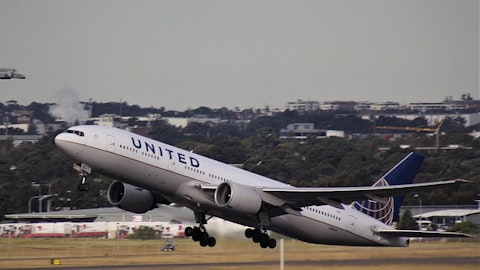Alex Malfitani: Exactly. And then on other expense, this is sort of a catchall. And so there are many things within this line. None of them are big enough yet for us to break them out, but we discussed that often here. But some of these expenses are driven, for example, by revenues, for example, GDS fees as our reservations increase. Sometimes when we start flying internationally, we start using more GDSs and then you see an increase in those fees by even more than our ASK growth. Some of these numbers here are driven by the exchange rates, some of these are driven by passenger count. But this is where we also recognize the cost of litigation and that is a number that we’ve been talking about the fact that this is increasing.
There is a bit of — the possible litigation is not a smooth number every quarter. I think this one was a particularly high quarter compared to historical levels and particularly compared to the same quarter last year. But this is something that the industry is very focused on. It’s a cost that all passengers in Brazil have to bear in spite of the fact that the customer experience in Brazil is one of the best in the world. We are the most on-time airline in the world. We have one of the highest NPS scores in the world, and there are other Brazilian airlines in these on-time rankings as well. So this is something that I think we’re all collectively interested, not just the airlines, not just the industry, but I think even the regulator and the government are interesting in finding.
John Rodgerson: I’ve said often that we’re now back to focusing on running the business. And so to answer your question, is this the new norm? It better not be. We’re going to drive the cost of this airline to be even more efficient going forward. We have a task force to go after a lot of these initiatives on a go-forward basis. And so nobody is happy with where that line is, and you’ll see improvement going forward. And there’s several things we’re working with the government on, as Alex said on the litigation side, but there’s other things that we’re doing. Now we’re focusing on the running the business. We’re focusing on driving our unit costs even lower.
Unidentified Analyst: Thank you very much guys.
John Rodgerson: Thanks, John.
Operator: Okay. Thank you. We will now move on to the next question. The next question will come from Gabriel Raposo with Bradesco sell-side analyst. Gabriel, you can open your microphone, so that you can ask your questions. You may proceed
Q – Gabriel Raposo: Good morning, guys. Can you hear me?
John Rodgerson: Yes.
Q – Gabriel Raposo: Okay. So I have two questions from our side here. The first one, we saw that as when peers are in talks with the government or airfare prices. So could you give us some color about this discussion and if there is any kind of discussion also regarding the fuel prices? And the second one is related to the Boa Brazil program, the Ministry of ports and airports should submit by November 15, the official proposal for the program. So could you guys update us about this program? And how should we expect Azul benefiting from this looking ahead? Thank you.
John Rodgerson: Yes, great. Thanks for the question. I have a pretty active agenda in Brasília and working closely with this new government on opportunities for Brazil, right? I think what’s an opportunity for Brazil. Brazil still has the highest fuel cost in the world. Brazil still has the highest civil claims in the world for aviation, where we’re 3% of the world’s flights, we’re 92% of the world’ lawsuits, and we run the most on-time airline in Brazil. Those are huge opportunities for this industry. There are huge opportunities to invite more people to fly. And so I don’t think the government is happy with where fares are in the country today. But fares need to be at these levels given the cost of capital, interest rates and the highest fuel cost in Brazil.
So the agenda in Brasília is to look at fuel prices, look at the cost of capital, look at these lawsuits and how can we invite more people to fly, which kind of leads to your second question, which is Boa Brazil, and that’s getting the Class C of Brazil to fly. And I think — our biggest desire is to have more people entering into aviation and flying more with us. We want to grow this airline. We think there’s tremendous opportunity. We’re currently in 160 cities in Brazil, and ABI has a forecast to be in 200 cities in Brazil. And we need to do that by attacking the structural cost disadvantages that Brazil has which creates an opportunity to create more jobs in Brazil, create more opportunity. Any time you hire a pilot, a maintenance technician is one of the best jobs you can get in Brazil.
And so Boa Brazil is a great program overall. We’ve been working very closely with the two ministers, one Minister, Márcio França, that started the program and then now Minister Silvio who’s kind of taking it on. But there was a change, and that’s one of the reasons why it hasn’t gotten off the ground yet, but we’re fully supportive of it. And I think there’s a lot of opportunity in Brazil. Look at what Azul has been able to do with the highest fuel cost in the world. Look at what Azul’s been able to do with the highest civil claims in the world. Imagine how many more Brazilians could be traveling by airplane if we attack some of the structural thing. That’s why I think there’s great opportunity in Brazil today. Fuel prices today are still 60% higher than they were in 2019.
That’s one of the reasons why fares are up, we’re grateful that fares are up because we need to run a profitable business. It’s good for our people. It’s good for investors. It’s good for our growth going forward. And so I think the agenda in Brasília is very positive.
Q – Gabriel Raposo: Thanks.
John Rodgerson: Thank you
Alex Malfitani: Thank you.
Operator: Moving on to the next question. The next question will come from Michael Linenberg, sell-side analysts from Deutsche Bank. Michael, we’re going to open your microphone so that you can ask a question. You may proceed.
Q – Michael Linenberg: Okay. Can you guys hear me?
John Rodgerson: Yes.
Q – Michael Linenberg: Great. I guess I have a couple here. John, and Abhi, you talk about how strong the demand environment is in Brazil. And yet when you look at the overall GDP estimates and sort of where we are right now in Brazil and over the next quarter or two, it does look like we may be going through a bit of a soft patch. Are you seeing anything with respect to corporate or even discretionary travel that would reinforce the fact that Brazil may be going in through a bit of a downturn and not just Brazil, but the Southern Cone. Anything — or are you defying sort of the macro backdrop?
Abhi Shah : Hey, Mike. So 3Q flown revenue was pretty good. We missed the all-time record just by 0.3%. But bookings actually in the quarter were even better. The accelerated kind of late in the quarter, September, October time frame. Bookings have been up 30% since June, for example, booked revenue. On the back of volume and fares, some of this, of course, helped by seasonality, late 3Q, 4Q is very, very strong seasonally and then our summer peak in January. But some examples, group’s revenue. Group’s revenue is three times higher than 2019. We’re just seeing a huge increase in conventions in corporate events, in trainings that’s something that what we hear from our corporate customers is going to continue. Corporate volumes 100% in terms of volume, much higher in terms of revenue but we had weeks with 100% corporate volume recovery.




